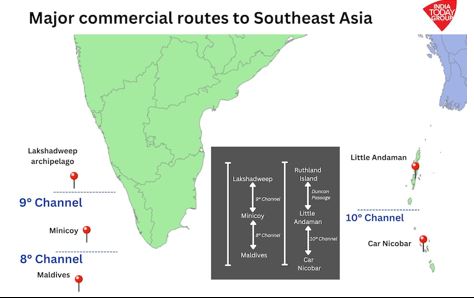

6th March 2024 (11 Topics)
Editorials
Context
The Indian Navy commissioned a new naval base, INS Jatayu, in the Minicoy Islands of Lakshadweep.
About
- INS Jatayu is India’s forward operating naval base in the Arabian Sea, acting as India’s sentinel and a primary responder to the escalating threats.
- INS Jatayu is India’s second naval base in Lakshadweep after INS Dweeprakshak in Kavaratti.
- Other key forward-operating bases and radar stations in Lakshadweep include INS Androth, INS Bitra, and INS Minicoy.
- Minicoy Islands is the southernmost island of Lakshadweep, about 215 nautical miles southwest of Kochi, which straddles the vital Sea Lines of Communications (SLOCs).
|
Fact Box: The Lakshadweep Islands
|


Editorials
Context:
There is a growing concern regarding safety issues faced by women while traveling alone, which has garnered increased attention due to recent incidents of violence against solo female travelers.
Perennial Concerns of Women's Safety:
- Act of rebellion: Traveling alone for women in India is often perceived as an act of rebellion due to pervasive safety concerns.
- Constant state of vigilance: Past experiences of unsolicited attention, comments, and even confrontations during solo travel contribute to a constant state of vigilance.
- Risks and challenges: Recent incidents, such as the gang-rape of a Spanish vlogger in Jharkhand, underscore the risks and challenges faced by women travelers, prompting renewed debate on safety measures and societal attitudes.
Challenges and Second-Guessing:
- Hesitation: Despite the desire to explore and experience new places, solo women travelers grapple with constant second-guessing and concerns for their safety.
- Negative attitude: The prevalence of insensitive comments and victim-blaming attitudes on social media further exacerbates the anxieties and uncertainties associated with solo travel.
- India’s ranking: Surveys highlighting India's ranking as one of the most dangerous countries for women and personal experiences of unwelcome encounters reinforce the need for greater awareness and action to address gender-based safety issues.
Gendered Experiences and Institutional Responses:
- Social norms: Women travelers often encounter skepticism and concern from authorities and locals alike, reflecting deep-rooted societal norms and perceptions.
- Compromised autonomy: Instances of police questioning and restrictions on women's mobility underscore the challenges faced in reclaiming public spaces and enjoying autonomy during travel.
- Barriers: Despite efforts to foster inclusivity and safety, incidents like unexpected stops during cab rides underscore the persistent barriers to women's freedom and sense of security while traveling alone.


Editorials
Context:
The recent Supreme Court verdict overturning the distinction between 'bribe-givers' and 'bribe-takers' in the JMM bribery case has sparked significant discussion on parliamentary privileges and the integrity of legislative functioning.
Correction of Legal Anomaly:
- Rectification: The Supreme Court rectified a long-standing legal anomaly that granted immunity to MPs and State legislators accused of accepting bribes in connection with their parliamentary duties.
- Previous distinction: The previous artificial distinction, established over 25 years ago, allowed prosecution of bribe-givers but shielded bribe-takers from legal consequences based on parliamentary privilege.
- Overturning: The ruling overturned the majority verdict in P.V. Narasimha Rao vs State (CBI/SPE) (1998), emphasizing probity as a crucial aspect of parliamentary functioning.
Clarification of Parliamentary Privilege:
- Clarification: The Constitution Bench clarified that parliamentary privilege, safeguarding freedom of speech and independence of legislators, does not extend to bribery, as it is unrelated to the casting of votes or decision-making.
- Immunity should not cover corruption: While the 1998 verdict prioritized protecting members from persecution for their parliamentary actions, the recent ruling emphasizes that immunity should not cover acts of corruption.
- No shield formal legalities: The verdict ensures that members are not shielded from legal accountability for actions unrelated to their legislative functions, aligning with public expectations of ethical conduct.
Upholding Legislative Integrity:
- Importance of preserving the integrity: The judgment underscores the importance of preserving the integrity of legislative processes by ensuring that members are not influenced by monetary inducements in their decision-making.
- Balance between parliamentary privilege and accountability: By recognizing the court's jurisdiction to prosecute members for bribery, the ruling maintains a balance between parliamentary privilege and accountability, reinforcing public trust in democratic institutions.
- Reinforcement: Overall, the verdict reinforces the principle that elected representatives must act in the public interest and adhere to ethical standards, contributing to the enhancement of democratic governance.


Editorials
Context:
The gender disparities observed in green jobs and the imperative of empowering women within the framework of low-carbon transitions underscores the hurdles faced by women in accessing opportunities in environmentally sustainable sectors and advocates for inclusive strategies to address these challenges.
Gender Disparities in Green Jobs:
- Underrepresentation: Despite the potential for 35 million green jobs in India by 2047, women remain significantly underrepresented in sectors such as renewable energy and manufacturing.
- Gender disparities: Existing data reveals stark gender disparities in training for green skills, with social norms and safety concerns limiting women's participation in technical roles.
- Unequal distribution: The unequal distribution of green jobs perpetuates gender biases in the labor market and constrains women's economic empowerment and agency.
Addressing Data Gaps and Structural Barriers:
- Limited data on women's participation in green jobs underscores the need for sex-disaggregated data collection and gender analysis to understand the landscape better.
- Overcoming structural barriers, including inadequate representation in STEM fields and societal norms, requires targeted policies and interventions to enhance women's access to green job opportunities.
- COP 28's initiative on 'Gender-Responsive Just Transitions and Climate Action Partnership' highlights the global commitment to inclusivity in transition planning and the importance of data-driven strategies.
Strategies for Women's Empowerment:
- Bridging the gender gap in STEM education and promoting early hands-on learning and mentorship can enhance women's participation in key sectors for green transition.
- Tailored financial policies, including collateral-free lending and financial literacy training, are essential to support women entrepreneurs entering the green economy.
- Promoting women's leadership in decision-making processes and fostering partnerships across sectors are critical for ensuring gender equity and inclusivity in low-carbon development strategies.






